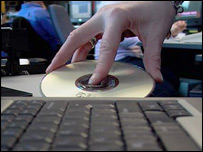
The BPI says downloaders buy less music - but a report disagrees
|
The global music industry is suing thousands of people who trade music online without permission.
More than 14,000 people in 12 countries have faced legal action for allegedly swapping music tracks online.
The BBC News website looks at what this could mean for music swappers around the world, and the issues behind the latest tactics.
I have downloaded music over the internet. Can I be sued?
Not if you have downloaded songs that have been put online with the approval of record labels and artists - which usually involves paying for royalties. Sanctioned services include Apple's iTunes and Napster as well as MyCokeMusic, Wippit HMV and Virgin.
The industry is targeting uploaders - those who make tracks in their collection available for other people to download - whether it is one song or a million. If you are an uploader, you are infringing copyright and run the risk of being sued.
Could I be sued for swapping just a few songs?
Theoretically, you could. But the British Phonographic Industry says the problem stems from a small hardcore of "serial uploaders" who offer hundreds or thousands of music files over the internet.
The BPI says 15% of file-sharers are responsible for 75% of all songs swapped illegally.
Can children be sued for uploading?
The BPI said it cannot differentiate between children and adults in its legal actions because it does not actually know their identities. Personal information is handed over by internet service providers once the BPI decides who it wants to sue.
But if it is a minor uploading music, then the BPI says it could still pursue legal action.
Why are record companies so worried?
Global annual record sales are down from $40bn (£22bn) to $33bn (£19bn) over the past five years.
The music industry, which has suffered massive redundancies and restructuring in the past decade, says the swapping of music files over the internet is one of the major parts of music piracy.
But there are conflicting reports about the impact of file-sharing. A recent report suggested that music fans who illegally share tracks over the internet also spend four-and-a-half times as much on licensed digital music as those who do not.
Why are they chasing individual users?
Until recently the music industry's only legal recourse was to pursue individual users.
But a ruling in the US supreme court found that the file-sharing service Grokster was responsible for encouraging users to share pirated material over its network.
That decision paves the way for further court cases against peer-to-peer companies.
Will legitimate online services ever rival the peer-to-peer sites?
The International Federation of Phonographic Industries has said that the number of legal tracks downloaded internationally tripled to 180 million in the first half of this year.
The volume of tracks being traded illegally rose only 3% to 900m, said the IFPI.
The global music body said the rise in legal downloads was proof its policy of pursuing file-sharers was working.

